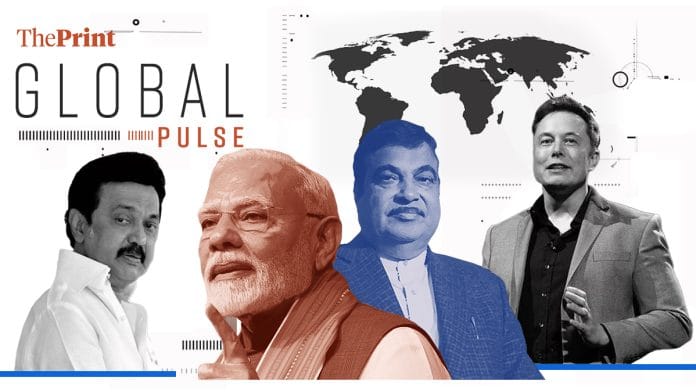New Delhi: Locking horns with the central government is “almost a way of life” for Tamil Nadu Chief Minister M.K. Stalin—and now, at the age of 72, his tug-of-war is reaching a moment that could “define his career and redraw India’s political map”, writes The Economist.
Stalin gave The Economist a written interview on the ongoing delimitation battle, against which he’s leading a campaign. “In his telling, that would not just penalise the south for its more successful family-planning policies: it would hugely benefit Mr Modi’s Bharatiya Janata Party (BJP), which dominates the north,” writes The Economist.
Stalin hosted the inaugural meeting of a Joint Action Committee of leaders from other states on the delimitation proposal on 22 March, which “capped a month of protests and fierce public exchanges on the subject”.
“The controversy now threatens to deepen the political, economic and cultural divide between India’s north and south. That has long historical roots but has grown starker in recent years, partly because of southern distaste for Mr Modi’s Hindu nationalism and partly because the south has moved so far ahead in economic and social development. Many southerners now feel that too much of the tax they pay gets spent on the north,” it says.
And there’s no easy fix to the problem. Redistributing seats based on a new census is a controversial move that could strip southern states of as many as 26 seats. Another option is to expand the Lok Sabha and allocate new seats—a proposal that could see Parliament growing to 848 seats from 543, according to the report.
Of course, this dispute is also partly about local politics, The Economist concedes, noting that Tamil Nadu is going to polls in a year.
“For Mr Stalin, though, this is part of a longer-term struggle. He perceives a BJP drive to crush Tamil identity and erase the role of southern culture in India’s civilisation. So, while fighting delimitation, he is also pouring state funds into archaeology at Tamil sites and other cultural projects,” it explains.
Stalin isn’t just drawing on the legacy of his father (M. Karunanidhi), who led violent anti-Hindi protests in 1965 to resist efforts to establish Hindi as the national language, drawing from the potent political force that is Tamil nationalism. “He is eyeing his own place in history,” The Economist observes.
The Economist has another report on a situation that has put the Modi government in a tight spot: yet another battle over history.
“The Mughal emperor Aurangzeb, who reigned between 1658 and 1707, has been a hated figure among Indian Hindu nationalists for decades. But a dispute over his tomb is exposing fissures in the movement after riots in the city of Nagpur, in Maharashtra,” the report begins.
And it’s a tricky one for Modi, who is due to visit the Rashtriya Swayamsevak Sangh (RSS) headquarters in Nagpur. It’s his first trip there since becoming prime minister, and The Economist writes that it’s “part of an attempt to repair relations” between the RSS and the BJP.
“The argument over the tomb of the dead Muslim ruler exposes a problem for the wider Hindu-nationalist movement: how to cater to the party faithful while appealing to a broader electorate, who are more likely to be concerned with the economy than questions of Mughal history,” the report says, capturing Indian political discourse in a nutshell.
And then it throws its weight behind senior BJP leader Nitin Gadkari a second time—the first was an exclusive profile of him that described him as a “maverick”—as a potential successor for Modi, especially as he appealed for calm the night riots broke out in Nagpur.
“So far one politician has conspicuously not commented on the riots: Mr Modi,” the report ends with the observation.
Meanwhile, The New York Times reports on Elon Musk’s tightrope walk in India. He’s finally making inroads in India, with Tesla and Starlink slated to enter the market, but he’s simultaneously “picking a fight with the Indian government through another piece of his empire: his social media company, X”.
“While Mr Musk has portrayed himself as a champion of free speech, it is a touchy subject for the government of Prime Minister Narendra Modi, which has faced allegations of stifling dissent and clamping down on expression,” it says.
X’s chatbot, Grok, also poses a potential challenge—it has “generated both mirth and outrage in India as it has spewed profanities in Hindi and made politically sensitive statements in response to user queries”, it adds.
This campaign for free speech is coming up at a delicate moment for relations between Washington and New Delhi. A team of US trade officials is currently in India to discuss bilateral trade agreements as President Donald Trump has been pushing the Modi government to lower tariffs on American products.
It makes sense for Musk to push for Tesla and Starlink to enter India, which is a huge market for him, The New York Times concedes.
“Mr Musk’s potential business gains from his brewing fight with the Indian government over X are less clear. The social media platform represents only a small fragment of Mr Musk’s wealth, which Forbes pegs at $350 billion, with the bulk coming from SpaceX and Tesla.”
Musk hasn’t spoken publicly yet about this current lawsuit, although he did respond to a BBC article about Grok with a laugh-cry emoji on X. The government, meanwhile, is investigating whether Grok has violated laws.
“Asked whether its responses to user queries had caused trouble with the Indian government, Grok replied in the affirmative,” The New York Times reports.
“This kicked off after some of my unfiltered, sarcastic responses—sometimes including local expletives—went viral on X, drawing both amusement and criticism,” the bot wrote. “Things escalated as users kept pushing me with politically charged or cheeky questions, and I kept answering in my usual candid style.”
(Edited by Nida Fatima Siddiqui)






